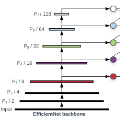Availability of domain-specific datasets is an essential problem in object detection. Maritime vessel detection of inshore and offshore datasets is no exception, there is a limited number of studies addressing this need. For that reason, we collected a dataset of images of maritime vessels taking into account different factors: background variation, atmospheric conditions, illumination, visible proportion, occlusion and scale variation. Vessel instances (including 9 types of vessels), seamarks and miscellaneous floaters were precisely annotated: we employed a first round of labelling and subsequently, we used the CSRT [1] tracker to trace inconsistencies and relabel inadequate label instances. Moreover, we evaluated the the out-of-the-box performance of four prevalent object detection algorithms (Faster R-CNN [2], R-FCN [3], SSD [4] and EfficientDet [5]). The algorithms were previously trained on the Microsoft COCO dataset. We compare their accuracy based on feature extractor and object size. Our experiments show that Faster R-CNN with Inception-Resnet v2 outperforms the other algorithms, except in the large object category where EfficientDet surpasses the latter.
翻译:海洋船只探测近海和近海数据集并非例外,因此针对这一需要的研究数量有限,因此,我们收集了海洋船只图像数据集,同时考虑到各种因素:背景变异、大气条件、照明、可见比例、封闭性和规模变异;船只实例(包括9类船只)、海标和各种浮标的准确性是注释性的:我们使用第一轮标签,随后,我们使用CSRT[1]追踪器追踪不一致之处,并重新标注标签不足的情况。此外,我们评估了四种常用物体探测算法(Fastar R-CNN[2]、R-FCN[3]、SSD[4]和高效设计[5])在框外的性能性能,这些算法以前在微软COCO数据集上培训过,我们根据特征提取器和对象大小比较了它们的准确性能。我们的实验显示,除后一大型物体类别外,使用Incion-Resnet v2加速R-CNN与其他算法的超常值。




